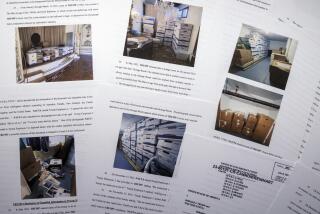SEC Criticizes Tactics Used by Drexel Lawyers : Called ‘Mischievous’ for Bid to Disqualify Judge
- Share via
NEW YORK — The Securities and Exchange Commission issued a stinging criticism of defense lawyers in the Drexel Burnham Lambert insider trading case, accusing them of “mischievous” and “arrogant” tactics in their attempt to disqualify the judge presiding over the case.
The criticism came in a series of court papers filed Wednesday by the SEC. Since the massive lawsuit was filed Sept. 7, accusing Drexel and several employees of insider trading, stock market manipulation and other violations of securities laws, defense lawyers have been trying to get U.S. District Judge Milton Pollack off the case.
Pollack agreed to take the case because he was already handling a series of private lawsuits involving related issues. But based on his record, defense lawyers believe that he is biased in favor of the government.
Last month, Drexel’s lawyers filed a motion asking the judge to disqualify himself from the case, claiming that he has a conflict of interest because his wife stands to gain from the planned sale of a Texas retail clothing chain.
Drexel is expected to raise some of the financing for the purchase of the chain, Palais Royal of Houston.
Denies Interference
In a document filed with Pollack, the SEC asserted that “there is no financial or other relationship between Mrs. Pollack and Drexel” and said she wouldn’t receive any money from Drexel. The agency also stated: “There is simply no reasonable basis for doubting Judge Pollack’s impartiality in this case.”
The SEC claimed that the defense lawyers didn’t actually believe that the Palais Royal sale would influence the judge. Instead, the SEC argued, it was simply part of desperate efforts by Drexel lawyers to force Pollack off the case.
The SEC documents charged that when the lawsuit was about to be filed, Michael Armstrong, a lawyer representing one of the Drexel defendants, tried physically to prevent an SEC staff member, a woman paralegal, from handing over the documents to the court clerk because they contained a request that Pollack be assigned to the case. Armstrong, a former head of the securities fraud unit in the U.S. attorney’s office in Manhattan, said: “It’s absolutely false that I physically interfered with the filing.”
The SEC also submitted a detailed argument showing why it believes that its case against Drexel is related to other suits being heard by Pollack, including a private suit against Drexel and several against former stock speculator Ivan F. Boesky.
Pollack is due to rule Tuesday on the disqualification motion.
But defense lawyers, concerned that the judge had already issued rulings on the gathering of pretrial evidence in the case before ruling on the conflict of interest claim, appealed to the U.S. 2nd Circuit Court of Appeals, asking the higher court to force Pollack to decide the disqualification issue before making any other rulings in the case.
No Decision Yet
In separate papers filed with the appeals court, the SEC called the appeal “an unprecedented and arrogant misuse of” the appeals process. The defense lawyers are expected to deny vigorously the SEC charges that they have used improper tactics.
As of late Wednesday, the court of appeals hadn’t yet decided whether it would grant a hearing in the appeal. An SEC lawyer said that if there is one, it may take place Friday.
More to Read
Inside the business of entertainment
The Wide Shot brings you news, analysis and insights on everything from streaming wars to production — and what it all means for the future.
You may occasionally receive promotional content from the Los Angeles Times.










